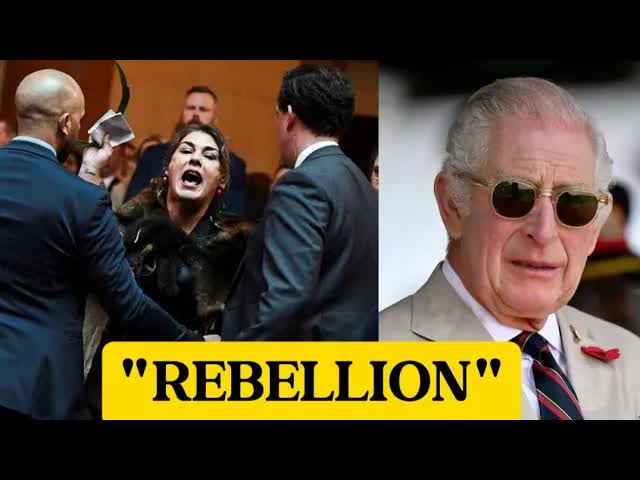In a scene that could only be described as dramatic, Senator Lydia Thorpe made headlines during a recent speech by King Charles in Australia.
As the monarch wrapped up what many expected to be a routine address, Thorpe seized the moment to voice her dissent, shouting, “You are not our king!
This is not your land!”
The unexpected interruption turned what could have been a mundane royal appearance into a memorable clash of ideals.
Imagine the atmosphere: King Charles, likely feeling confident in his royal duties, suddenly faced a fiery challenge from the Indigenous senator.
Thorpe’s words echoed through the venue, resonating with many who feel the weight of Australia’s colonial past.
It was a moment that caught everyone off guard, and one can only wonder what went through the King’s mind as he stood there, confronted by such passionate opposition.
Thorpe’s protest wasn’t just a spontaneous outburst; it came with a purpose.
She demanded a formal apology from the King for the historical injustices inflicted upon Indigenous Australians by British colonizers.
In that moment, she transformed her heckling into a powerful statement about the ongoing struggle for recognition and justice among Indigenous communities.
The disruption of the royal address highlights a broader issue that has long simmered beneath the surface in Australia.
The relationship between the monarchy and Indigenous peoples is fraught with tension, rooted in a history of dispossession and cultural erasure.
Thorpe’s bold stance serves as a reminder that these issues cannot be swept under the rug, even during high-profile events.
King Charles, known for his diplomatic demeanor, remained composed amidst the uproar.
He didn’t react visibly to Thorpe’s passionate declarations, which some may interpret as a strategic move to avoid escalating tensions further.
However, this non-reaction might speak volumes, potentially opening the door for future discussions about reconciliation and healing.
Media coverage of the incident has been extensive, fueling debates across the nation.
News outlets have been quick to analyze the implications of Thorpe’s protest, with opinions divided.
Some view her actions as a courageous stand for Indigenous rights, while others criticize her for breaching royal protocol.
The incident has ignited discussions on social media, with hashtags and heated exchanges reflecting the public’s polarized views.
This protest is more than just a singular event; it represents a significant moment in Australia’s ongoing dialogue about its colonial legacy.
The echoes of Thorpe’s demands resonate far beyond the immediate setting, tapping into a collective consciousness that seeks acknowledgment and change.
It’s a vivid reminder that the past continues to shape the present.
As the dust settles, the monarchy’s role in Australia is under scrutiny like never before.
Future royal visits will likely be met with increased public awareness and expectations regarding Indigenous issues.
The delicate balance of tradition and modernity is now more critical than ever, as the monarchy navigates its place in a society grappling with its history.
Thorpe’s protest also highlights a global movement among Indigenous populations, urging recognition and reparations for historical wrongs.
This isn’t just an Australian issue; it’s part of a larger conversation happening worldwide.
The monarchy must now consider how its actions and statements are perceived on the international stage.
In the wake of this royal ruckus, calls for change are louder than ever.
Many hope that this moment will serve as a catalyst for meaningful dialogue between the Crown and Indigenous Australians.
Could this be the beginning of a new chapter in their relationship?
Only time will tell, but the urgency for action is palpable.
As the narrative unfolds, one thing is clear: Senator Lydia Thorpe’s interruption has sparked a vital conversation about identity, sovereignty, and the need for recognition.
The royal visit may have intended to reinforce traditional ties, but it instead illuminated the fractures that exist within them.
The road ahead will undoubtedly be complex, but the voices of those advocating for change will not be easily silenced.
So, as we watch this royal drama unfold, let’s remember that the fight for justice and recognition is far from over.
This moment may just be the tip of the iceberg in a larger movement toward healing and understanding in Australia.
Grab your popcorn, because the story is just beginning, and it promises to be anything but dull.
